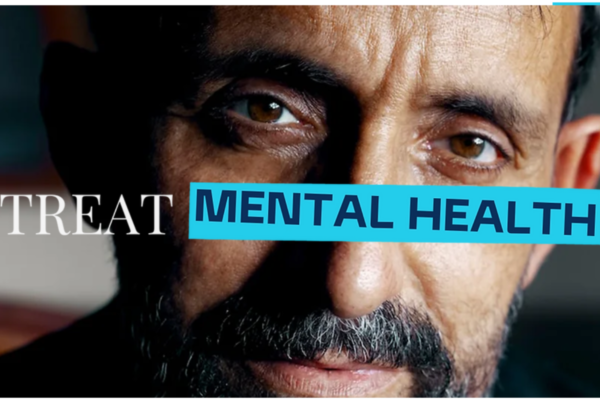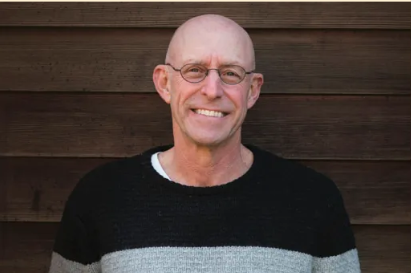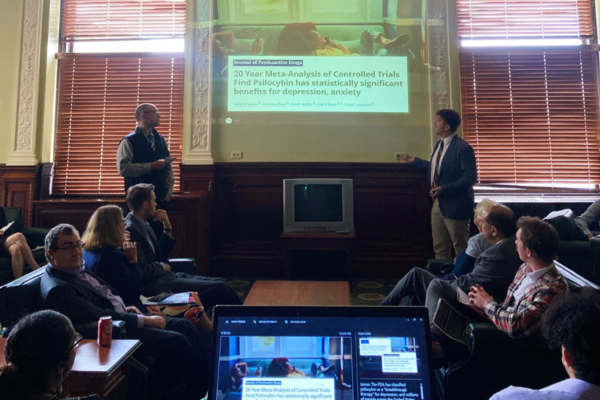
Psychedelic access continues to expand, with Minneapolis becoming another in the growing list of cities decriminalizing psychedelics or deprioritizing related arrests.
More research is underway too, and the scope of psychedelic studies keeps expanding. Following Australia’s groundbreaking approval of psychedelics for therapeutic use, researchers are now directing their attention to studying the potential well-being benefits of these substances, particularly for individuals grappling with grief after losing a loved one to cancer.
Compass Pathways, a publicly-traded biotech company, is currently researching the effectiveness of COMP360 synthetic psilocybin in treating various mental health disorders. In a recent study, they explored the potential of psychedelics in alleviating symptoms of patients suffering from anorexia nervosa. This groundbreaking research offers new hope for both patients and practitioners who are seeking alternative treatment options.
Minneapolis Mayor Jacob Frey signs executive order that makes psychedelic-related arrests the lowest priority for law enforcement

The order recognizes the physical and mental health conditions common to many Minneapolis citizens, which the COVID-19 pandemic has exacerbated. It acknowledges that entheogens can improve the well-being of its users and helps them overcome these hurdles. It also excludes peyote from the list of entheogens at the request of the National Council of Native American Churches, respecting its ancient ceremonial use.
Mayor Frey refers to several FDA-sanctioned clinical trials showing the effectiveness of psilocybin-assisted therapy and the power of ibogaine to alleviate treatment-resistant cases of opioid and methamphetamine addiction. With this measure, he intends to follow in the footprints of Detroit, Oakland, Seattle, Washington D.C., San Francisco, and Berkeley.
However, it’s the first time a mayor has implemented this reform without consulting or seeking approval from other officials or parties. Still, the city’s police chief has voiced his support for the measure.
New California ballot initiative proposes creating a $5 Billion state psychedelics agency to fund research focused on therapeutic applications

A campaign in California has recently submitted a proposed initiative for the state’s 2024 ballot. This initiative aims to establish the TREAT Institute, a dynamic and streamlined organization dedicated to the advancement of treatment, research, education, access, and therapies involving psychedelic medicines. This pioneering institute, would receive $500 million in funding through government agency revenue bonds instead of tax revenue annually to provide grants and loans for psychedelics research.
Instead of proposing decriminalization or legalization directly, its goal is to slowly build a path toward FDA approval by supporting studies on the risks and benefits of psychedelic-assisted therapy for addiction, anxiety, depression, and other disorders. It would also focus on implementing these therapies for first responders and military veterans to generate consensus.
According to the text of the proposed initiative to amend the state Constitution, “The TREAT Institute will not be a typical government agency; it will be an innovative, effective, and lean organization that will provide a consistent, sustainable funding source.”
One of the campaign’s first goals is to raise $11 million to support its campaign costs. After the attorney general writes the ballot title, summary, and question, TREAT California has 180 days to get 874,641 valid signatures from registered voters to qualify for the ballot. Deb Hubers, COO of TREAT, is confident about reaching this number, citing UC Berkeley’s recent study on the public’s perception of psychedelics.
Michael Pollan spoke about the future of psychedelic research in a candid interview
This week, EL PAÍS interviewed Michael Pollan, author of the best-selling psychedelic book How to Change Your Mind, who has become one of the most influential figures in the second wave of psychedelics. One of the newspaper’s journalists sat down to talk with Pollan shortly after he spoke in a 5000-seat auditorium at Colorado’s Psychedelic Science convention.
The author also expressed his delight in the book’s remarkable success, which led to its adaptation into a captivating docuseries on Netflix. Pollan shared how numerous individuals have expressed gratitude for introducing them to the realm of psychedelics, enabling them to initiate profound transformations in their lives.
Pollan also envisions this burgeoning psychedelic revolution to be driven by rigorous research, while cautioning against the potential for unrealistic expectations fueled by the hype surrounding these substances. He expresses concern that a bubble may be forming, prompted by a series of promising yet small-scale clinical trials exploring the efficacy of psychedelics in treating mental health disorders. This has inadvertently led some individuals to perceive them as a panacea.
The author also expresses concern regarding the emerging underground market of unlicensed psychedelic therapists, guides, and unregulated retreats. These entities exploit their customers and potentially expose them to significant risks. However, there is hope that psychedelics can contribute to combating opiate addiction, as evidenced by certain experiments. In such a scenario, psychiatrists would have an additional tool at their disposal to address this nationwide crisis.
Michael Pollan has adapted to his new role as a psychedelic spokesperson, founding the UC Berkeley Center for the Science of Psychedelics. This center was responsible for conducting a national poll that studied the perception of psychedelics among the American public. He is determined to stimulate research and demystify these substances, generating more nuanced discussions.
Small-scale study links psychedelic-assisted therapy with an improvement of anorexia nervosa symptoms

A recent study published in Nature Medicine presents an exciting new phase 1 trial that explores the potential of synthetic psilocybin in the treatment of anorexia nervosa. Anorexia nervosa is a profoundly debilitating mental health condition that has yet to find an effective treatment. This groundbreaking research offers promising insights into a potential solution for this challenging disorder.
Patients suffering from AN develop intense anxiety over gaining weight, causing them to become malnourished, with numerous health risks. Over time, the disorder distorts the perception of their shape, exacerbating the condition. Less than half of patients recover, and almost 50% of recovered patients relapse down the line.
The investigators gave ten female patients diagnosed with anorexia nervosa a 25mg dose of COMP360, a synthetic version of psilocybin developed by biotech company Compass Pathways. They aimed to learn if a single dose of the drug was safe, tolerable, and positively affected their condition.
The study had positive results, with 40% of participants seeing a clinically significant reduction in eating disorder psychopathology at the three-month follow-up mark. Participants experienced significant reductions in shape concerns during the one-month follow-up, as well as weight concerns during the three-month follow-up. At the three-month follow-up, there were notable improvements in eating concerns, which were nearly reaching statistical significance. It is worth noting that the body mass index (BMI) increased for five patients at the three-month follow-up; however, these changes were not deemed statistically significant.
According to the participants, the psilocybin experience held deep meaning. A remarkable 90% reported feeling more positive about their life endeavors, while 80% considered the experience to be one of the top five most meaningful in their entire lives. Additionally, a significant 70% of participants expressed a shift in personal identity and an overall enhancement in their quality of life.
Although small in scale, the study showcases the potential of psilocybin in aiding individuals with AN to break free from toxic behavioral patterns and cultivate a more adaptable mindset. Additionally, it has the ability to shift their focus away from previous fixations, such as weight and shape, for those struggling with anorexia.
Read also: New Study Shows Psilocybin May Be Effective in Treating Anorexia Nervosa
Australian scientists will explore if psychedelic-assisted therapy can treat grief from cancer loss

Australia’s recent legalization of psychedelics for therapeutic use has sparked an influx of research, and scientists are exploring how these substances can improve people’s mental health.
The first-ever approved trial aims to explore the potential of using psilocybin to treat adults struggling with prolonged grief after losing a loved one to cancer. Long suffering inflicts severe emotional distress, impeding individuals’ ability to maintain normal functioning and adversely affecting their home, work, and relationship dynamics.
The researchers at QIMR Berghofer Medical Research Institute in Brisbane, Australia, are planning to administer psilocybin to a select group of 15 participants, coupling the treatment with psychotherapy both before and after dosing to assess its potential effectiveness in aiding grief resolution.
“We want to investigate whether psilocybin-assisted psychotherapy can bring some relief and help them live with their loss,” said Vanessa Beesley, assistant professor at the QIMR Berghofer Medical Research Institute in Brisbane, Australia. “We’ve been encouraged by other trials where similar psilocybin interventions were associated with rapid and enduring mental health benefits for people with treatment-resistant depression and end-of-life anxiety.”
Dr. Stephen Parker, the trial’s psychiatrist, is hopeful that this new form of therapy will be more effective than traditional methods, planning to roll out a more extensive study if this one is successful.






